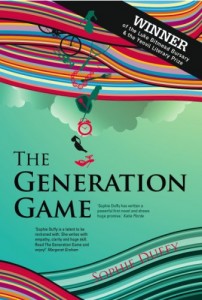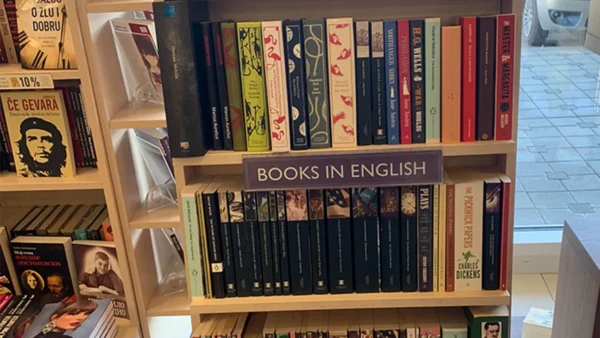 An interesting premise: the book starts with a woman in hospital talking to her newborn baby girl. She starts to tell the story of her life, beginning with her own birth in St Thomas’s Hospital in 1965 and going right up to the present day.
An interesting premise: the book starts with a woman in hospital talking to her newborn baby girl. She starts to tell the story of her life, beginning with her own birth in St Thomas’s Hospital in 1965 and going right up to the present day.
“I’ll tell you my story. Our story. Because there’s nothing worse than wondering. Knowing is always better.”
It works well to begin with the end, and to return to it regularly through the telling of everything that led up to that point. It builds anticipation and has us wondering how Philippa ends up where she is, who the baby’s father is, how Philippa’s life gets to that place.
The early chapters are told very cleverly, using an adult’s voice but a child’s sensibility. Even Philippa’s experiences as a baby and toddler are covered, which I think is a difficult thing to do well, but it really worked here. As we move through Philippa’s childhood, adolescence and finally adulthood, the central interest is from the characters such as her distant, aloof mother and her adoptive father Bob.
The story speeds up quite a bit when Philippa is an adult. I suppose that reflects our way of remembering our lives – early childhood experiences can seem so visceral, whereas later events often merge together. As a child, I remember the summer holidays seeming to last forever, whereas in adulthood I am often shocked at how fast the years go by (I’m still struggling to accept that it really is such a futuristic-sounding year as 2011). For me, the effect in this book was that the childhood years made a stronger impression upon me, whereas the years from 20 to 40 moved too fast for me to get much sense of the characters. I have a much clearer impression of the old woman Wink, for example, than of Philippa’s husband Adrian.
There are a couple of big revelations at the end, one concerning Philippa’s mother and one about her love life. I won’t give away the details, of course, but I’ll just say that I found the one about the mother very satisfying – completely unexpected but completely believable, and answering a lot of questions from the earlier part of the book. The romantic one I was less convinced by, but maybe that’s because, as I said, I wasn’t so wrapped up in the adult part of Philippa’s life. The book for me was about Philippa’s odd relationship with her mother, and that central theme I thought was beautifully explored and very pleasingly concluded.
This book won the Luke Bitmead Writer’s Bursary in 2010. Click here to read my review of the latest winner. Or click here to read more reviews of The Generation Game on Amazon.



There are 10 comments
This one sounds really interesting, thanks for reviewing it!
Hi Willa,
Yes, it’s a good one – would recommend it. I think you are my first ever commenter from Denmark, so wanted to extend a warm welcome to you 🙂
This sounds quite unusual. Is it a first novel, I haven’t heard of the author before?
It’s interesting that you think she deliberately chose to focus on childhood to mirror how we experinece the flow of the years, the memories from our childhood being more intense and those from later years much less.
Hey nice review! I will add this to my TBR stack. Loved your blog too 🙂
Hi Caroline,
Yes, it is a first novel – the winner, in fact, of the Luke Bitmead Award, which is presented to an unpublished manuscript and results in a publshing contract (the same award I won for On the Holloway Road). On the childhood memories – yes, that was my impression, although it may be my own experience rather than the author’s!
Hi Nivedita,
Glad you liked the review, and the blog in general 🙂 Always nice to hear. Welcome!!
Wonderful review, Andrew! I loved your observation – “early childhood experiences can seem so visceral, whereas later events often merge together.” Your comment on the futuristic-sounding-2011 made me smile 🙂 This looks like a beautiful book from your review. I will look for it.
Thanks Vishy! Yes, I just can’t get used to it being 2011. I remember being a child and thinking the year 2000 seemed impossibly far away. (I’m not that old, by the way – maybe just struggling to move forward!!)
I’m so intrigued, I want to read it now. Loved your review. It makes the novel sound really easy flowing, one that doesn’t work to hard to hit you over the head with something hard :). Thanks.
That’s a good way of describing it, Kinna – glad that came across in the review. It’s a simple story, well told, with compelling characters that make you want to read through. That’s not to say there’s no depth to it, because there is – just that, as you say, it doesn’t try too hard.